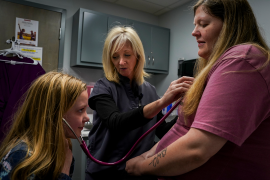
Since 2013, the Commonwealth Fund’s Health Care Delivery System Reform program has focused on ways to improve health care and outcomes for two populations: high-need, high-cost patients (including frail elders, the disabled, and those with multiple chronic conditions) and vulnerable populations, or those with low incomes. We spoke with Pamela Riley, M.D., M.P.H., who directs the portfolio of grants focusing on vulnerable populations, about her program strategy and what she’s accomplished so far.
Why focus on vulnerable, or low-income, populations?
Pamela Riley: For all of its 100 years, the Commonwealth Fund has been committed to improving health care for vulnerable populations, including women, children, and rural Americans. My work focuses on people with low incomes, who are disproportionately racial and ethnic minorities. Because they are less likely to have health coverage, they may have little interaction with the health care system. They are less likely to receive recommended preventive care, including dental care, blood pressure checks, cancer screenings, and flu vaccinations, and more likely to wind up in the emergency department or hospital for a condition that might have been treated elsewhere. They are also twice as likely as those with higher incomes to have behavioral health problems, three times as likely to be socially isolated (which we know can have implications for health), and 10 times more likely to experience food insecurity.
How is the health system failing vulnerable Americans?
Pamela Riley: Providers serving vulnerable patients struggle to engage patients in their care and meet their physical, behavioral health, and other needs. We’ve funded research investigating whether Medicaid accountable care organizations (ACOs) could help coordinate physical, behavioral, and dental services for vulnerable populations. We’ve supported the Center for Health Care Strategies to develop resources for states interested in promoting Medicaid ACOs.
We also know that the health system can do much more to address behavioral health problems such as addiction and depression that often go undetected and untreated among vulnerable populations. Because health plans are now required to cover behavioral health services, there is real opportunity to focus on how to maximize those benefits. We’ve supported research identifying quality measures to assess the level of physical and behavioral health care integration, and illustrating the potential of the Medicaid programs to drive such integration.
What can health care providers do to help people who don’t always have nutritious food or stable housing?
Pamela Riley: It’s not news to most health care professionals that if their patients’ basic needs aren’t met, they’re not likely to stay healthy, no matter how good their care. But many providers don’t know how to help. Over the past several years we’ve supported the nonprofit organization Health Leads to create a road map for providers as they work to identify patients’ social needs and connect them to resources. We’ve funded research exploring how health care organizations can address patients’ social needs in a financially sustainable way. And we’ve also engaged Manatt Health researchers to study ways to use Medicaid managed care funding to support nonmedical interventions, like helping people find jobs.
Medicaid is clearly a key player: what have you learned about the potential of state Medicaid programs to promote improvements in care for vulnerable populations?
Pamela Riley: As the largest payer, Medicaid has a lot of leverage. We’ve supported research to look at ways in which Medicaid can promote better value as health care purchaser. Are there, for example, alternative payment models that might work in federally qualified health clinics, which are generally given prospective payments and may need incentives to move toward value?
We’ve also looked at how Medicaid managed care plans, which provide care for more than half of beneficiaries, might help improve care for vulnerable populations (including a look at strategies in 10 states that expanded Medicaid, managed care regulations that encourage integration of behavioral health care, and ways that managed care plans are addressing social needs).
What else is needed to engage more low-income patients in their care and ensure it meets their needs?
Pamela Riley: Improving primary care is probably the most important thing we can do in terms of health services to improve the health of vulnerable populations, and the Commonwealth Fund is just starting to look for models of how to do this. We know that primary care clinicians feel largely underprepared to meet the behavioral health and social needs of their low-income patients. So we need to find ways to support practices in their efforts to partner with community-based organizations, for example, or incorporate members of the community on their teams, to meet patients’ comprehensive needs.
We also know health care is often inconvenient or inaccessible to low-income patients, who may lack paid time off work or transportation to visit the doctor, leading many to rely on the emergency department. We need to think about ways to bring the tools of concierge medicine — telehealth visits, 24/7 access — to these populations as an alternative to high-cost settings of care.
While we do this, we have to be careful not to put too much on the back of primary care providers. Finding ways to effectively partner with community-based organizations is critical to reducing the burden on primary care providers. As more and more states are turning to managed care plans to deliver care for their Medicaid beneficiaries, we’ll be tracking how plans can support primary care providers as they work to improve care for low-income patients.
Please visit centennial.commonwealthfund.org




